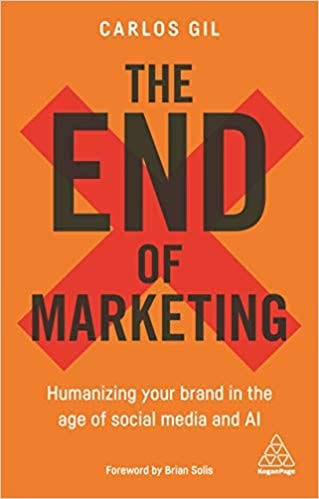
The marketing field is ever-changing and always has been. The way we reach people continues to evolve, and marketers work to keep-pace. But will it ever end? One man seems to think so. The End Of Marketing: Humanizing Your Brand In The Age Of Social Media and AI suggests just that.
The End Of Marketing
Let’s cut right to the chase, this book totally misses the mark and it’s not worth your time. What’s wrong with The End Of Marketing: Humanizing Your Brand In The Age Of Social Media and AI? Here are just a few of the problems.
After a really poor foreword by Brian Solis that’s disjointed and rambling, things don’t get any smoother.
The author states the book is for marketers but then goes on to explain the most basic concept of what Snapchat is, in the same way you’d explain it to grandma that’s never heard of it.
All that’s offered is the same worthless advice you hear from all the other “marketing experts” who are more interested in promoting themselves than offering anything of real value. “Share great stuff people want to see.” Really? Brilliant. We’d all been thinking we should be sharing stuff our audiences hate. This changes everything!
Carlos Gil begins a chapter with how influencer marketing doesn’t work and goes on about how worthless it is. Then he spends the rest of the chapter talking about DJ Khaled and Kim Kardashian, two of the biggest influencers on the planet. Clearly influencer marketing works because the author absolutely worships the guy.
Continuing to trash influencer marketing, he then tells us about getting brand ambassadors which he somehow believes are different in that you just send them free product or monetary payment. You mean, exactly like you would an influencer? He talks later about how he hired an influencer and how great it was, after slamming it in a previous chapter. At the end, he says influencer marketing does work, despite saying it doesn’t in the chapter on the topic.
The chapter on employee advocacy gets even more hypocritical. We’re told that people want your brand to be authentic and today it’s all about authenticity. Then he jumps into talking about how you should give employees pre-written messages to control what’s posted about your brand on social media. That’s super authentic and genuine.
Many chapters have unrelated topics and babble that doesn’t seem to fit anywhere, so they’re just stuck in randomly.
In the end, there’s no conclusion. It’s clear the author had no idea how to tie things up, so you find yourself suddenly done. Which I suppose is fine, as the pain of reading this bomb is finally done.
No End In Sight
Marketing isn’t anywhere close to ending. In fact, in this age of transformation, it’s only beginning. The End Of Marketing is a failed attempt to grab attention and bolster the authors own profile. It’s a mess of boring reading and bad examples.
Save yourself the time and torture and skip this book. The end is not near, and you’re far better off exploring the real possibilities that current technology offers marketers.
